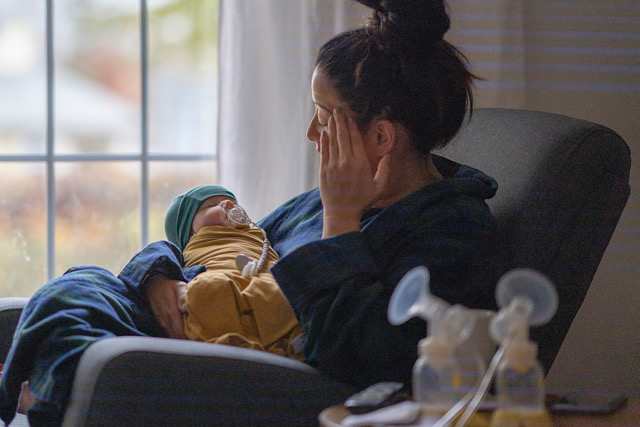May marks Maternal Mental Health Awareness Month and a time to focus on the importance of mental health during pregnancy and shortly after birth. You are likely aware that 80% of new mothers report the “baby blues,” or intermittent periods of tearfulness, worry, irritability and fatigue. However, a lesser known statistic is that over 20% of new mothers meet criteria for a pregnancy or postpartum mood disorder.
The current COVID-19 pandemic is further complicating the experience of motherhood. Many mothers have had to grieve the loss of celebrations like baby showers that help with the transition and preparation of parenthood. Birth partners and supports have had limited access to prenatal appointments and, in some extreme cases, to the delivery rooms because of COVID-19 safety concerns. Further, new mothers have had to rely on fewer options for instrumental support after the arrival of their baby due to social distancing guidelines and overall fear of the virus. All of these losses have experts in maternal mental health concerned about the emotional well-being of the current cohort of expecting and new mothers.
With one in five mothers meeting criteria for a mental health disorder during or after pregnancy, this means that statistically most of us have had a friend, a sister, a mother, or co-worker who have suffered. However, the research reports that the barriers to talking about these issues (embarrassment, shame, guilt) get in the way. Additionally, many report that they were unaware of the different ways that maternal mental health problems can present.
Maternal Mental Health Disorders can present in different ways
Depression during pregnancy and postpartum (PPD)
PPD is the hallmark diagnosis in maternal mental health. A mother with PPD might experience feelings of anger, sadness, irritability, lack of interest in the baby, guilt, shame, changes in appetite, difficulty concentrating, feelings of hopelessness, and sometimes thoughts of harming herself or her baby.
Anxiety during pregnancy and postpartum (PPA)
A mother with PPA might experience extreme worry or concern, often over the health or safety of the baby or over their own abilities as a mother.
Pregnancy or postpartum Obsessive-Compulsive Disorder (OCD)
A mother with pregnancy or postpartum OCD might have repetitive and unwanted thoughts or images (obsessions) in addition to developing the need to do something repeatedly (compulsions) to reduce the anxiety caused by the thoughts.
Postpartum Post Traumatic Stress Disorder (PTSD)
A mother with postpartum PTSD might have experienced a traumatic or frightening childbirth or past trauma that was exacerbated by childbirth. PTSD symptoms often include flashbacks of the trauma with feelings of anxiety and the urge to avoid things related to the event.
Bipolar Mood Disorders
Many women with Bipolar Disorder are actually diagnosed for the first time during pregnancy or postpartum. A mother with Bipolar Disorder might experience severe depression or symptoms of mania.
Postpartum Psychosis
A mother with postpartum psychosis might hear voices or see images that are not there. They may have beliefs that are untrue and experience distrust towards loved ones. They may also have episodes of memory loss, confusion, and impaired mental status.
In the last several years, screenings for maternal mental health concerns have improved. Evidenced based tools such as the Edinburg Postnatal Depression Screen (EPDS) and Patient Health Questionnaire (PHQ-9) have helped identify and diagnose mothers who need support. There is still much to do, but with the right access to accurate information, we can increase knowledge, decrease stigma, and open the door for more mothers to access the mental health resources they need.
Resources specific to maternal mental health
Postpartum Support International
https://www.postpartum.net/
The National Perinatal Association
http://www.nationalperinatal.org
Every Mother Counts
https://everymothercounts.org
National Child and Maternal Health Education Program
https://www.nichd.nih.gov/ncmhep/initiatives/moms-mental-health-matters/moms
Maternal Mental Health Now
https://www.maternalmentalhealthnow.org

